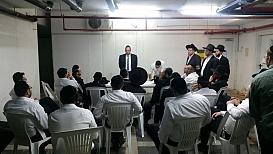The first time (that I know of) was about the lack of a mikva in the neighborhood. No mikva has yet been built, and the city has not yet even begun construction on the one that will eventually be built. The mayors response is that the mikva is two and a half years away. New neighborhoods don't have all the necessary resources, and that's the way it is. People need to be patient.
After that we had the lack of school buildings, and gans being opened up in residential buildings. After fighting the issue, the gans were made to hold off until permits could be given and other solutions considered.
And now the complaints are about the lack of shuls. Due to there being no shul buildings, they have to find creative solutions (that really are not all that creative) such as meeting for services in parking lots and storage rooms.
 Over 100 residents met with Deputy Mayor Shmuel Greenberg to complain about the situation.
Over 100 residents met with Deputy Mayor Shmuel Greenberg to complain about the situation.As well, another issue raised was that the roads and traffic circles are dangerous to drivers (I do not know why). About this Greenberg said he will set a meeting with the transportation committee to find solutions for the problems. About the lack of shuls, Greenberg said new places have natural absorption issues that eventually get worked out.
source: Shemeshnet
While some places are more organized and efficient and build public infrastructure along with the new neighborhoods, knowing the eventual residents will need the infrastructure when they eventually move in, historically Bet Shemesh has not bene the most organized in that regard. In RBS A we had similar issues when the neighborhood began to be populated and in those early days.
The Iryah's response is correct, even though it does implicitly admit blame for lack of planning.
As poorly as the Iryah planned the new neighborhood and as irresponsible as they have been with providing the necessary services for the residents of the new neighborhood, the residents should be aware that what they see is what they are going to get. They can expect more of the same. They bought in a place where houses are a priority and services for those houses are not. They should accept that reality, of course while continuing to fight and demand the services they deserve.
And yes, even in the best and most efficient municipal governments (of which Bet Shemesh is not included), there are absorption issues in new neighborhoods, and they have to give some leeway and have some understanding because of it.
------------------------------------------------------ Reach thousands of readers with your ad by advertising on Life in Israel ------------------------------------------------------
